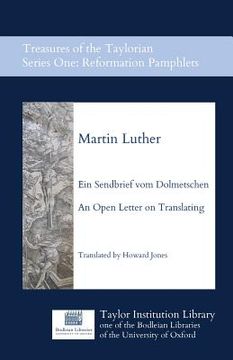Reseña del libro "Ein Sendbrief vom Dolmetschen - An Open Letter on Translating (en Inglés)"
Martin Luther wrote the Open Letter on Translation in September 1530 at the fortress of Coburg in Saxony where he was being kept for his own protection. It was a crucial moment in the Reformation: his colleagues were at the Imperial Diet at Augsburg, making a formal proclamation of Protestantism before the Emperor. Luther used the Open Letter to defend his translation of the Bible, and the work has become a seminal document in German literature, translation studies, and Reformation theology.Luther's German translation unlocked the Bible for the millions of his contemporaries who did not understand Latin. It was not the first German version of the Bible, or even the first in print, but it was the first to reach a mass audience. Given Luther's belief in 'sola scriptura', that is, scripture as the sole medium for the word of God, the translation of the Bible was an enactment of his own theology. A vernacular Bible in the hands of the laity was also a powerful weapon to challenge Church practices which had no scriptural basis. It was not just the fact that Luther translated the Bible that was important: it was also the way he did it. Like others before him, Luther cultivated a sense-for-sense, as opposed to a word-for-word, approach. His great innovation was a translation style close in register to colloquial speech, but with a simple eloquence that brought the original text alive. The language of Luther's Bible was so influential that even his opponents, Catholic and Protestant alike, used it as the basis for their own rival versions. Luther's German Bible was to serve for centuries as a model of grammar and style, and to play a foundational part in the development of the standard language.In the Open Letter on Translation Luther offers general advice on translation as well as a defence of some of the specific translation choices he made in his German New Testament. From these it becomes clear what his guiding principles were as a translator: an intimate knowledge of the source and target language, a feel for the idiom of both, and an understanding of the author's purpose. The same questions preoccupy translators today, whether they are working with sacred texts or not. The Open Letter affords us a glimpse into the translation technique of one its most successful exponents. The Open Letter also gives us a taste of Luther's style and method of argument. His syntax and vocabulary are plain and direct, his tone sometimes academic but more often informal, and the text is interspersed with colourful turns of phrase. His arguments are, in keeping with academic discourse at the time, a combination of appeals to reason or authority, ridicule, and invective. In the Open Letter we have Luther, at one point, analysing the Hebrew, Greek, and Latin precedents to argue against the translation, 'Mary, full of grace', and, at another, summarizing his attitude to Dr Snotty-Nose and his other detractors as follows: 'The fact is, a donkey doesn't need to do much braying: you just have to look at his ears'.This new edition of the Open Letter introduces the work for the modern reader, and the translation aims to bring Martin Luther's irreverent and brilliant rhetoric to life, as the great practitioner explains his methods and principles.

